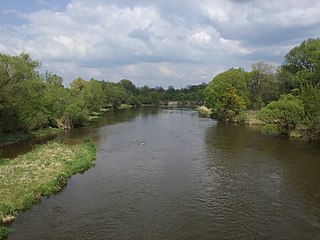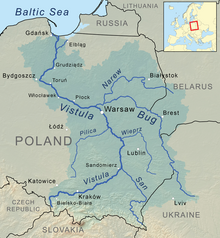| Pilica | |
|---|---|
 Pilica river in Tomaszów Mazowiecki (Białobrzeska Street) | |
 Pilica River in the Vistula watershed | |
| Location | |
| Country | Poland |
| Physical characteristics | |
| Source | |
| • location | Poland |
| Mouth | |
• location | Vistula near Ostrowek |
• coordinates | 51°51′41″N 21°16′50″E / 51.86139°N 21.28056°E |
| Length | 333 km (207 mi) |
| Basin size | 9,258 km2 (3,575 sq mi) |
| Discharge | |
| • average | 47.4 m3/s (1,670 cu ft/s) |
| Basin features | |
| Progression | Vistula→ Baltic Sea |
The Pilica is a river in central Poland, and the longest left tributary of the Vistula river, with a length of 333 kilometres (8th longest). All 9,258 km2 of its basin area is in Poland.[1]
It flows through the Polish Jura, after which it enters Central Polish Plains. Pilica flows into the Vistula near the village of Ostrowek, in a geographical region of Central Vistula Valley. In 1974, a dam was built near Sulejow, resulting in the creation of man-made reservoir Sulejow Lake, which has the area of 2,700 hectares. The region in the basin of the Pilica is sometimes called Nadpilicze, and the river itself marks boundary between Lesser Poland, and two other historical provinces of the country, Greater Poland and Mazovia.
The first "open-air river museum" in Poland, the Open-air museum of Pilica river, is located on the waterway and the Blue Springs nature reserve lies next to the river.